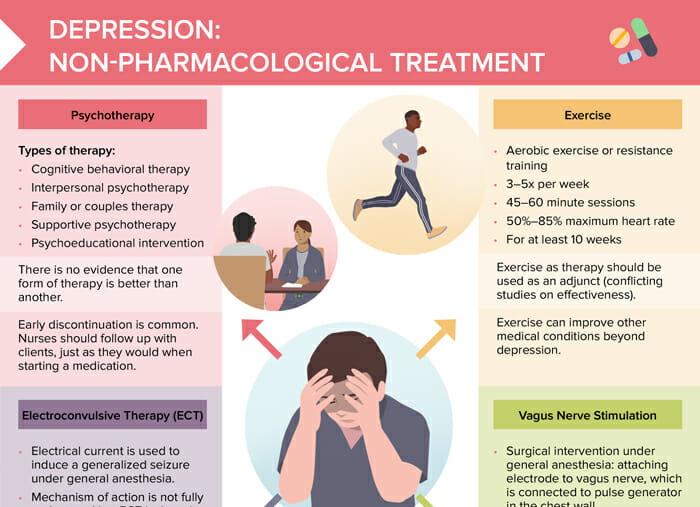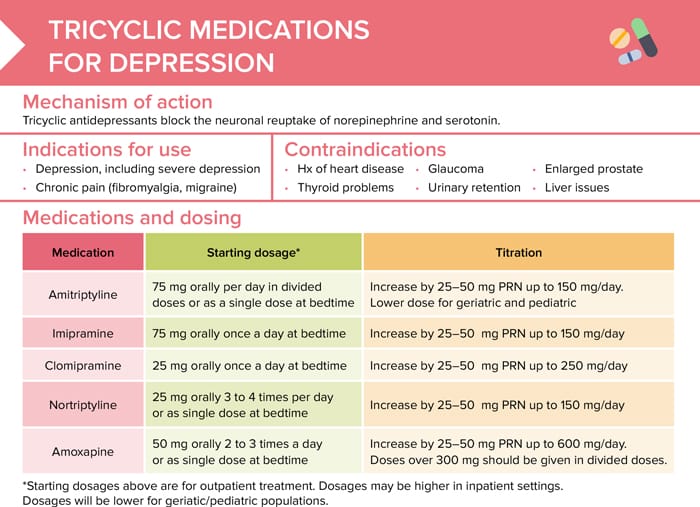What are tricyclic antidepressants?
Tricyclic antidepressants (TCAs) are a class of drugs primarily used to treat depression, but with a narrower spectrum of FDA-approved indications than SSRIs.
Indications for TCAs
Indications for tricyclic antidepressants are depression (including severe) and chronic pain (fibromyalgia, migraine). Indications for SSRIs further include generalized anxiety disorder, obsessive compulsive disorder (OCD), post traumatic stress disorder (PTSD), social anxiety, premenstrual dysphoric disorder (PMDD), bulimia nervosa, and others. The choice between TCAs and SSRIs also depends on the specific patient/client needs, their side-effect profile tolerance, and potential interactions with other medications.
Contraindications for TCAs
- History of heart disease
- Thyroid problems
- Glaucoma
- Urinary retention
- Enlarged prostate
- Liver issues
How do tricyclic antidepressants and SSRIs work?
Tricyclic antidepressants block the neuronal reuptake of norepinephrine and serotonin, while SSRIs only block the reuptake of serotonin.
What is norepinephrine?
Norepinephrine, also known as noradrenaline, is a neurotransmitter and a hormone regulating the body’s stress response and other various physiological processes. As a neurotransmitter, it affects mood, arousal, vigilance, and attention. As a hormone, it aids in the constriction of blood vessels, raising blood pressure. An excess or deficit of norepinephrine can lead to various medical conditions including mood disorders, hypertension, and more.
What is serotonin?
Serotonin, chemically known as 5-hydroxytryptamine (5-HT), is also a neurotransmitter that plays an important role in regulating various physiological and behavioral processes in the body, including mood regulation, digestive functions, sleep, blood clotting, and bone metabolism.
Side effects of tricyclic antidepressants
Potential side effects of tricyclic antidepressants include:
- Sedation
- Confusion
- Orthostatic hypotension
- Arrhythmias, cardiac toxicity
- Weight gain
- Dry mouth, constipation, blurred vision (anticholinergic)
- Urinary retention
SSRIs have a similar side effect profile to TCAs, with TCAs having a higher likelihood of anticholinergic side effects and a higher risk for cardiac issues.
Common tricyclic antidepressants, dosages, and titration
Table: Common tricyclic antidepressants
| Medication | Starting dosage |
| Amitriptyline | 75 mg orally per day in divideddoses or as a single dose at bedtime |
| Imipramine | 75 mg orally once a day at bedtime |
| Clomipramine | 25 mg orally once a day at bedtime |
| Nortriptyline | 25 mg orally 3 to 4 times per dayor as single dose at bedtime |
| Amoxapine | 50 mg orally 2 to 3 times a day or as single dose at bedtime |
Nursing tips and client education around tricyclic antidepressants
- Avoid alcohol with this medication.
- Drowsiness is common, especially when starting TCAs. Do not drive or operate machinery until you know how you are affected.
- Can interact with other drugs and supplements; talk to your provider before starting anything new.
- Medications take 2–3 weeks to see benefit, 6 weeks for maximum effect.
- Your provider will start with a low dose and increase it as needed.
- Do not abruptly stop medications; talk to provider about tapering.
What is one possible risk of using benzodiazepines and tricyclic antidepressants with older adults?
Benzodiazepines and tricyclic antidepressants in older adults can increase the chances of falls and fractures due to sedation, dizziness, and orthostatic hypotension.
Tricyclic antidepressants vs SSRIs: comparison
The main difference between tricyclic antidepressants and selective serotonin reuptake inhibitors is that while SSRIs primarily block the reuptake of serotonin, TCAs block the reuptake of serotonin and norepinephrine, affecting multiple neurotransmitters. TCAs can have more side effects compared to SSRIs, such as dry mouth, blurred vision, constipation, urinary retention, cardiac effects, and are more dangerous in overdose.
Despite their higher risk profile, TCAs might be chosen over SSRIs in certain situations:
- Specific indications may respond better to TCAs (neuropathic pain, certain anxiety disorders)
- When a patient does not respond to SSRIs (SSRI resistance)
- When a patient has responded to TCAs well in the past

